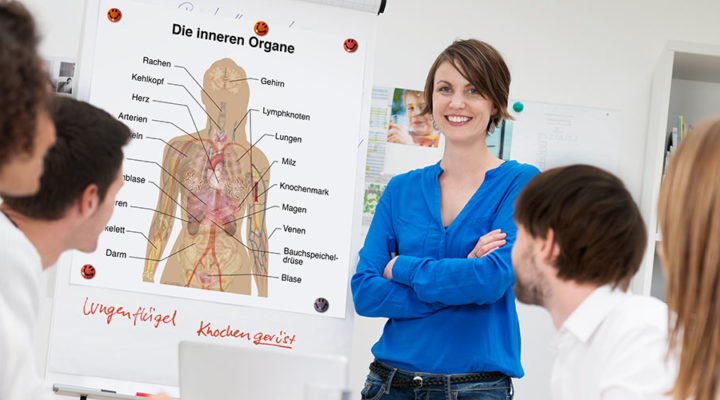Irena is a trained nurse from Macedonia and moved to Berlin a couple of months ago. She had wanted to move to Germany since she first visited the country as a tourist three years ago, but she didn’t take this decision lightly.
In this interview, she tells us about her first steps into her new life. Half a year into her job in a clinic in Berlin Irena has learned a lot of what it means to start anew in in this young and fast-paced city, and she has come to regard Berlin as her second home.
Start Relocation: Germany has a great need for medical professionals. You are a trained nurse with very good references. Was it easy to find a job here?
Irena: In the beginning I thought finding a job would be easy. I contacted the Federal Employment Agency and quickly had some interviews with them. However, I didn’t have a very good impression of their service and I found it difficult to trust them. I then checked online and found out that they had gotten quite negative ratings in the past! Their promises don’t seem to match reality. First they tell you that you will be paid well and have a good job, but in the end that never happens. I was very disappointed, but my husband then put me in touch with
Start Relocation.
Yes, we had already supported your husband with getting his visa and work permit for Germany – and we had found a flat for both of you here in Berlin.
Exactly! And Nenad has been very happy with your service and glad he could recommend you.
Your colleague Miriam told me immediately that she would be happy to help me, and it was “love at first sight”. Getting a job placement with her was very different from what I had experienced with the Federal Employment Agency. Instead of talking endlessly with authorities and filling out questionnaires, she put me in direct contact with my future employer and I could ask them all the questions I wanted.
I am sure Miriam already had some suggestions in mind when she met you…
Miriam advised me to start in a smaller clinic first, so it is easier for me to integrate and learn German as well as all the medical termini! She contacted a small clinic in West Berlin for me, and we had a meeting soon after – me, Miriam, and the head of the hospital. We sat down together and discussed the job, what my expectations are and what the clinic would require of me. My boss then asked me when I wanted to start and I said: Immediately!
(laughs)
Do you like your job?
Absolutely! I was a bit nervous in the beginning of course – a new job in a new country, and everything is in German. But I knew that I only needed some time to get used to the new circumstances, and then I would be able to prove what I know and what I can do!
…I am sure it was still difficult in the beginning.
Of course the work flow and how situations are dealt with here are very different from Macedonia. German hospitals have better medical equipment, higher hygienic standards and easier procedures. To be honest – before I started work I was not sure if I could make it. It is so difficult to prove yourself when you have difficulties to communicate in the local language!
I learn so much every day here! This makes me proud and happy. Every day has its new challenges, I really like that. My colleagues and the doctors were a great help in the beginning, and they are still now. We are an international team and my fellow nurses come from all over the world – China, Peru, Bulgaria, Chzech Republic. All of us know exactly how it feels to start in a new place, so we are almost like a family for each other. The patients are from all over the world as well! When there are people from Turkey for example that don’t speak English or German, one of my Turkish colleagues takes over. From what I can tell – I think you can only have good experiences as a nurse here.
How is the support you get from the hospital?
Really good. I remember one situation in the beginning that almost grew over my head. I was alone on shift and had to prepare the equipment for blood sampling, everything had to go very fast. But I didn’t know the names of the medical instruments and where they were stored! One of the doctors quickly helped me and showed me everything, and all went well in the end. This moment gave me great strength and motivation to learn. When you work in a hospital you have to be very fast – a fast learner and a fast worker. This is not a problem if you have good support from your colleagues, and now I know all the medical names and exactly where I find which instrument.
We also have regular classes for medical German that are paid for by the hospital. They have been helping me a lot as well!
Do you have feedback for us as well?
Sometimes I have time to think and then I ask myself: Is this really true? Did this actually happen? I think it doesn’t happen so often that everything comes together at the right time and place. I am very grateful for this. I know I can always ask
Start Relocation when I have problems and that they will respond to me super fast and help me whenever they can. Our move to Berlin from Macedonia went very well – without you it would have been very difficult. Finding a job, getting the right permits and all this paperwork done! And the flat market in Berlin is so difficult, we would have never found our current place without you. Relocating is easy when there is somebody helping you through the whole process and who is always there for problems and questions. I am very grateful, because I know that not everybody has the chance to have this.
What do you advise others with the same wish like you?
If you really want to move to Germany, then do it. It’s almost impossible to make mistakes here – people in Berlin are nice and so international! Life here is fast and the people are young. It’s easy to adapt to and integrate into this city.
I hope everyone has the chance like me to succeed here. I hope that everything will work well for others coming here, too. If you work really hard and if you really want something, it will happen. It might not be easy in the beginning, but if you have one goal and one direction then you will succeed – you have to know where you want to go.
In Berlin there are so many possibilities, not only in regard to work. Everyday there are new things to learn, to develop yourself. In Macedonia we also lived in the capital, but it was different there. In Berlin there are always new impulses, new challenges, there is always something going on. If you want to become something or someone, you can just do it. I don’t know why, but I feel relaxed here. I go to the streets in the morning and I feel that I fit. In Macedonia I often felt stressed – life felt more difficult then.
•
Would you like to find out more about relocating to Germany? Just
email us if you have any questions about the immigration process.






















